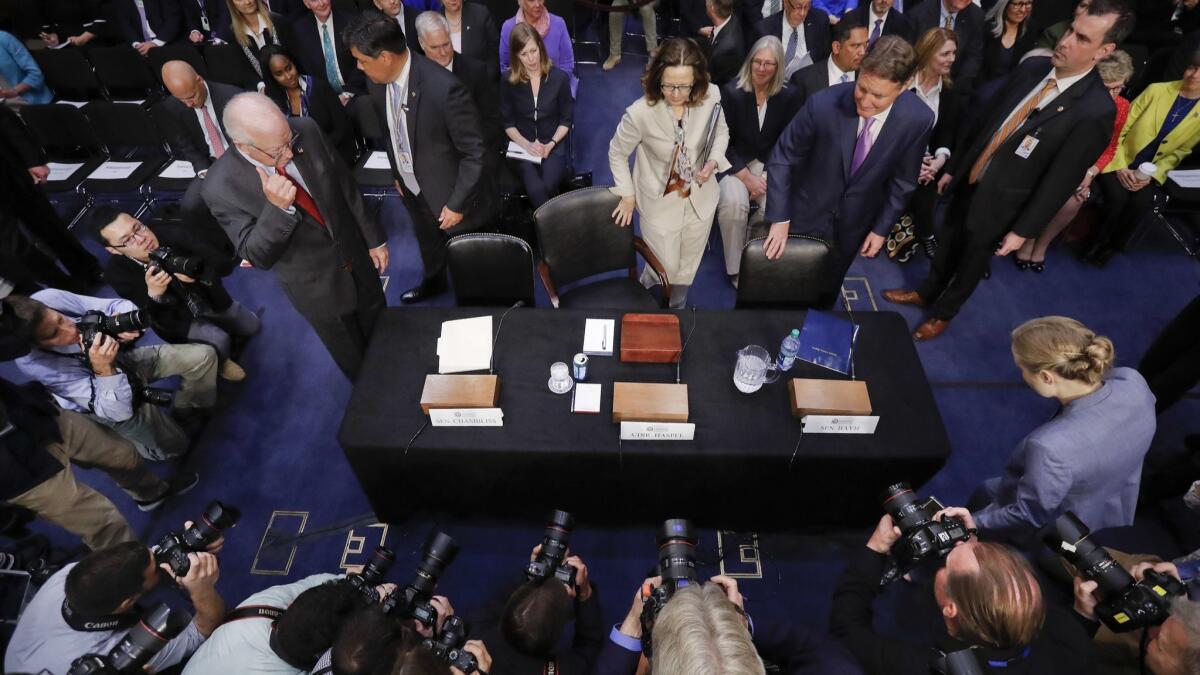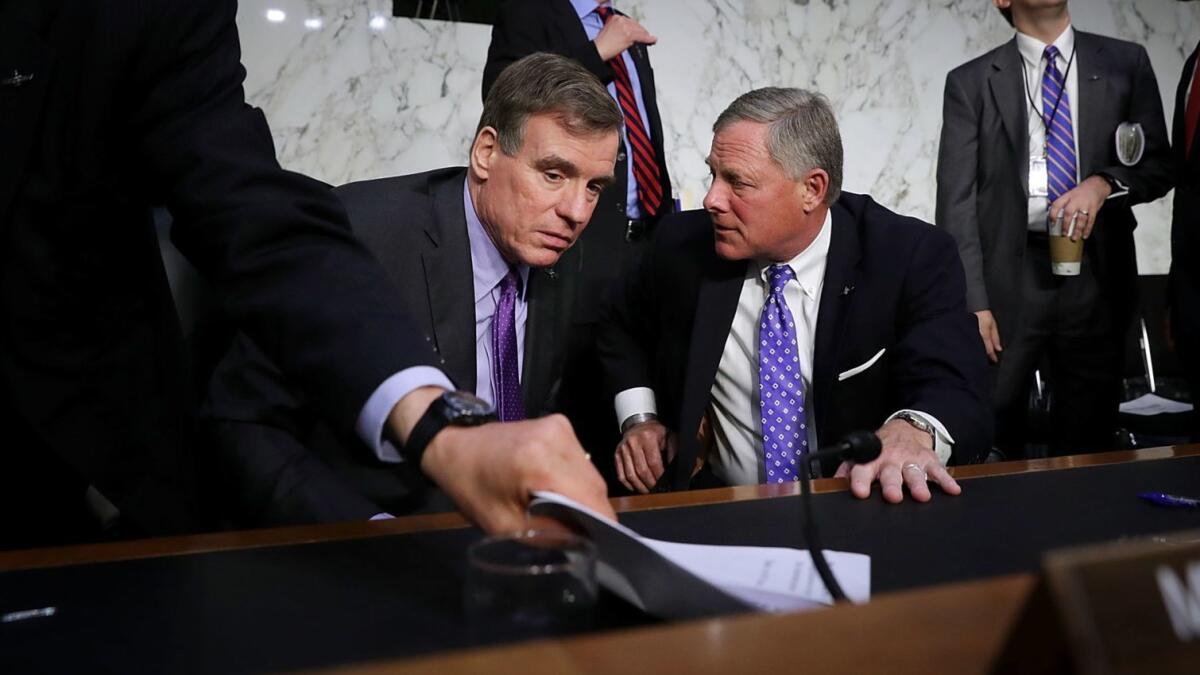Gina Haspel pledges she won’t let the CIA resume abusive interrogations

Reporting from Washington — In a contentious confirmation hearing that reopened the painful debate over CIA abuse of terrorism suspects, Gina Haspel pledged Wednesday she would not revive the use of secret prisons and harsh interrogations if she is confirmed to lead the nation’s premier intelligence agency.
The Senate Intelligence Committee hearing served as an uncomfortable public debut for Haspel, a veteran but controversial CIA officer who spent nearly all of her 33-year career recruiting and managing spies as an undercover operative in Africa, Europe and Central Asia as well as at CIA headquarters in Langley, Va.
She came under fire from Democrats and some Republicans clearly nervous about whether endorsing Haspel would amount to whitewashing what the CIA called enhanced interrogation tactics, and what critics called torture, after the Sept. 11 attacks. The practices are now banned.
In 2002, Haspel briefly ran the CIA’s then-secret “black site” prison in Thailand, where detainees were waterboarded and subjected to sleep deprivation, body slamming and other abuses. Her role there is still mostly classified, and protesters interrupted the hearing by chanting “Bloody Gina” and “Don’t reward torture.”
“I want to be clear,” Haspel told the committee. “Having served in that tumultuous time, I can offer you my personal commitment, clearly and without reservation, that under my leadership CIA will not restart such a detention and interrogation program.”
Haspel tried to assure skeptical senators that she wants to leave the discredited program in the past, even as she defended her career in the shadows and sought to protect other intelligence professionals who might face legal jeopardy after participating in authorized operations.
The balancing act meant her answers sometimes grew tangled under pointed questioning. She pledged to follow her “moral compass” in the future, but declined to say whether she believed previous CIA practices were immoral. She said she supports laws that outlaw torture, but said the harsh interrogations were permitted under legal guidance at the time.
“I’m not going to sit here, with the benefit of hindsight, and judge the very good people who made hard decisions in extraordinary circumstances,” she said.
Her testimony failed to satisfy Sen. John McCain (R-Ariz.), an avowed critic of torture who is being treated for brain cancer in Arizona. The former Navy pilot was tortured as a prisoner of war after he was shot down over North Vietnam in 1967, and human rights activists have urged him to speak out against Haspel.
In a statement, McCain said Haspel is “a patriot who loves our country” but “her refusal to acknowledge torture’s immorality is disqualifying.”
McCain’s opposition could harden resistance to Haspel, but it’s unclear whether it will doom her nomination. Sen. Rand Paul (R-Ky.) has said he will vote against Haspel, eliminating the Republicans’ 51-49 majority, but at least one Democrat has vowed support.
After the hearing Wednesday, Sen. Joe Manchin III (D-W.Va.) said he will vote for her, saying he has “the utmost respect for the sacrifices she has made for our country.”

Haspel pushed back at times during the hearing, calling it a “tragedy” that the interrogation controversy had cast a shadow on the CIA’s efforts to prevent another mass casualty terrorist event while the nation was still reeling from the attacks on Sept. 11, 2001.
Haspel has drawn unusual support from current and former members of the intelligence community — dozens have publicly endorsed her — as she seeks confirmation in the full Senate.
Questions about CIA interrogations dominated the hearing almost to the exclusion of other major concerns.
Haspel was not asked how the CIA should respond to Trump’s decision Tuesday to withdraw from the Iran nuclear deal, for example. Nor was she asked about Trump’s efforts to stage a nuclear summit with North Korean ruler Kim Jong Un, even though she has played a role in planning.
Follow the latest news of the Trump administration on Essential Washington »
Supportive Republicans said the focus on a few episodes from Haspel’s long career was regrettable.
“Many want to make your nomination about one small piece of the agency’s past,” said Sen. Richard M. Burr (R-N.C.), the committee chairman. He praised Haspel as perhaps “the most qualified nominee ever nominated for this role.”
Democrats said they targeted her role in the interrogations because Trump said last year that he would “bring back” waterboarding, a painful process that involves pouring water on a prisoner’s face to simulate drowning.
“You should consider carefully how you might deal with morally questionable results in the future,” warned Sen. Mark R. Warner (D-Va.), the committee vice chairman. “If confirmed you will face a White House, frankly, in my view, a president who does not always seem interested in hearing, much less speaking, the truth.”

The Senate hearing was marked by sharp exchanges with the two California Democrats.
Sen. Dianne Feinstein asked Haspel whether she had advocated for destroying videotapes of interrogations at the CIA site in Thailand. Haspel helped draft a memo in 2005 for a supervisor who then ordered officers to feed dozens of tapes into an industrial shredder. Subsequent internal and criminal investigations resulted in no charges.
“I absolutely was an advocate,” Haspel responded. She said she was motivated to protect the CIA officers who participated in the interrogations. “I never watched the tapes. But I understood that our officers’ faces were on them.”
Sen. Kamala Harris pushed her further. “The president has asserted that torture works. Do you agree with that statement?” she asked.
“I don’t believe that torture works,” Haspel said. But she added a caveat. “We got valuable information from debriefing of Al Qaeda detainees, and I don’t think it’s knowable whether interrogation techniques played a role in that.”
At another point, Haspel sidestepped repeated questions from Harris about the morality of waterboarding and other now-banned tactics. “Do you believe in hindsight that those techniques were immoral?” Harris asked.
“I think I’ve answered the question,” Haspel responded.
“No, you have not,” Harris said.
Haspel joined the CIA in 1985 and served undercover, mostly overseas, until February 2017, when she became the deputy director. She has been acting director since Mike Pompeo was confirmed as secretary of State last month.
If confirmed, she would be the first operations officer in five decades to rise through the ranks to lead the agency. She also would be the first woman to head the CIA, as she pointed out in her opening remarks.
“It is not my way to trumpet the fact that I am a woman up for the top job, but I would be remiss in not remarking on it — not least because of the outpouring of support from young women at CIA who consider it a good sign for their own prospects,” she said.
Haspel pitched herself as someone with the loyalty of the agency’s workforce and the knowledge to run its espionage and other operations around the globe.
“I know CIA like the back of my hand,” she said.
Senators seeking to publicize additional information about Haspel, however, have run into a wall of secrecy. The CIA made classified records available Monday, but Democrats want more declassified. They noted at the hearing that Haspel, as the acting director, could help provide documents but has not done so.
Haspel defended the decision to keep the specifics of her role in the interrogation program, and other details about her career, under wraps. She disclosed no new details during the hearing.
“I have chosen to follow the guidelines,” Haspel said. “I am electing not to make an exception for myself.”
Twitter: @chrismegerian
UPDATES:
6:10 p.m.: This article was updated with a statement from Sen. John McCain.
3:45 p.m.: This article was updated with additional quotes and details.
9:44 a.m.: This article was updated with additional details from the hearing.
8:05 a.m.: This article was updated with details from the confirmation hearing.
This article was originally published at 5 a.m.
More to Read
Get the L.A. Times Politics newsletter
Deeply reported insights into legislation, politics and policy from Sacramento, Washington and beyond. In your inbox three times per week.
You may occasionally receive promotional content from the Los Angeles Times.











